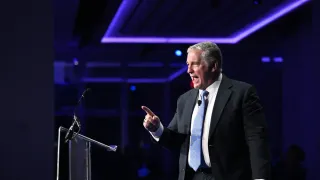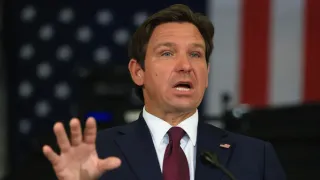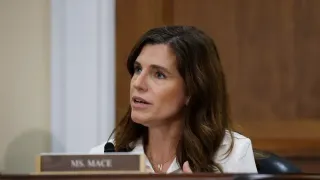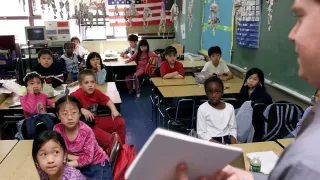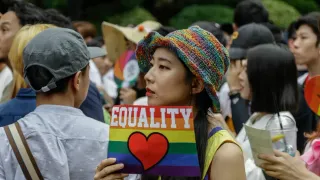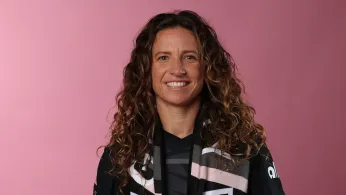
7 hours ago
NWSL Player Elizabeth Eddy’s New York Post Essay Ignites Controversy Over Transgender Inclusion in Soccer
READ TIME: 4 MIN.
On October 26, 2025, Elizabeth Eddy, an Angel City FC defender and veteran of the National Women’s Soccer League (NWSL), published an op-ed in the New York Post and issued a parallel statement on social media, calling for the league to implement clear gender eligibility standards that would effectively bar transgender and intersex women from participation in the NWSL . Eddy asserted that the absence of such policies “serves no one, as questions and controversy abound over intersex and transgender athletes.” In her essay, she argued that women’s soccer requires protection from what she described as “unfair competition,” citing differences in muscle mass between athletes assigned female at birth (AFAB) and those assigned male at birth (AMAB).
Eddy proposed two possible standards for eligibility: requiring all players to be “born with ovaries,” echoing the Football Association’s (FA) approach in England, or implementing an SRY gene test, as seen in World Athletics and World Boxing, to determine eligibility for women’s competitions . She asserted that such rules are necessary to “protect the integrity of women’s sports.”
The essay triggered immediate and widespread condemnation across the soccer world and beyond, especially from LGBTQ+ advocates, NWSL fans, and many players. Critics called the proposals transphobic and harmful, arguing that they perpetuate stigma against transgender and intersex athletes and disregard the lived experiences and identities of these individuals . Social media platforms saw a surge of responses denouncing Eddy’s call for restrictive policies, with many users highlighting the NWSL’s history as an LGBTQ+ inclusive space.
Angel City FC, Eddy’s club, released a statement in response to the controversy, distancing itself from the views expressed in the essay. The club emphasized its commitment to inclusivity and support for all players, regardless of gender identity . The incident has also sparked renewed discussions within other NWSL teams and among league leadership about how to address gender eligibility while upholding values of inclusion and respect.
The NWSL, which has cultivated a reputation as an LGBTQ+ ally, previously enacted a transgender athlete policy in 2021. This policy allowed transgender women to compete if they declared a female gender identity, maintained testosterone levels within accepted limits, and complied with periodic testing . However, the league quietly eliminated this policy in 2022, leaving no clear guidance on the participation of transgender and intersex athletes.
League Commissioner Jessica Berman stated in November 2024 that the NWSL would “continually live by our values and support everyone in our ecosystem, inclusive of our fans, our players, our employees, in every community where we operate.” She added that the league is “committed to working directly with the NWSL Players Association on any changes to our league policies” to ensure that player voices remain central to policymaking and that the league’s commitment to inclusion, trust, and transparency is reinforced . Nonetheless, the lack of a formal policy has left room for op-eds like Eddy’s to gain attention and fuel debate.
Eddy’s essay arrives at a time when transgender participation in sports is under scrutiny worldwide, with governing bodies in athletics, swimming, and boxing adopting increasingly restrictive policies. However, many athletes and advocates for LGBTQ+ rights argue that such policies are discriminatory and not supported by scientific consensus, especially at the grassroots and amateur levels .
Women’s soccer, in particular, has a longstanding tradition of LGBTQ+ activism and solidarity. In 2022, United States Women’s National Team (USWNT) players wore wrist tape reading “protect trans kids” during a match in Texas . Becky Sauerbrunn, a respected USWNT veteran, wrote in a 2023 op-ed: “Since I started playing soccer, I’ve faced countless challenges to gender equity in sport, from pay disparity to unsafe working conditions. I can assure you that playing with or against transgender women and girls is not a threat to women’s sports.” Earlier in 2025, Manchester City star Kerstin Casparji celebrated a goal by kissing her trans pride flag wristband, an act widely interpreted as a statement of support for transgender athletes .
The fallout from Eddy’s essay has reignited urgent conversations about inclusion, fairness, and who gets to define the boundaries of women’s sports. While some argue that clear eligibility standards are necessary to ensure fair competition, many others emphasize that blanket bans on transgender and intersex athletes are not only scientifically questionable but also undermine the NWSL’s role as a leader in LGBTQ+ inclusion .
Several advocates point out that the NWSL’s core fanbase and a significant proportion of its player pool identify as LGBTQ+. Actions or policies that signal exclusion risk alienating this community and contradict the league’s history of championing diversity and equality .
As the league faces pressure to clarify its stance, the experience underscores the challenges that all sports organizations face in balancing inclusion, fairness, and competitive integrity. The NWSL has stated that it will work with the NWSL Players Association to develop any future policies, suggesting that athletes’ voices—particularly those from marginalized communities—will be central to the process .
The controversy surrounding Elizabeth Eddy’s New York Post essay is emblematic of a broader struggle in sports and society over the meaning of inclusion, fairness, and who gets to participate. For many in the LGBTQ+ community, the response from fans, players, and the league itself will be a litmus test for the NWSL’s commitment to its stated values. As the debate continues, the NWSL’s approach could have far-reaching implications, not only for its own players and fans but also for the future of women’s sports worldwide.
